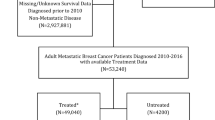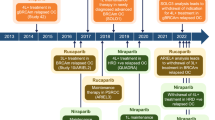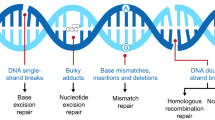Abstract
Purpose
In LOTUS (NCT02162719), adding the oral AKT inhibitor ipatasertib to first-line paclitaxel for locally advanced/metastatic triple-negative breast cancer (aTNBC) improved progression-free survival (PFS; primary endpoint), with an enhanced effect in patients with PIK3CA/AKT1/PTEN-altered tumors (FoundationOne next-generation sequencing [NGS] assay). We report final overall survival (OS) results.
Methods
Eligible patients had measurable previously untreated aTNBC. Patients were stratified by prior (neo)adjuvant therapy, chemotherapy-free interval, and tumor immunohistochemistry PTEN status, and were randomized 1:1 to paclitaxel 80 mg/m2 (days 1, 8, 15) plus ipatasertib 400 mg or placebo (days 1–21) every 28 days until disease progression or unacceptable toxicity. OS (intent-to-treat [ITT], immunohistochemistry PTEN-low, and PI3K/AKT pathway-activated [NGS PIK3CA/AKT1/PTEN-altered] populations) was a secondary endpoint.
Results
Median follow-up was 19.0 versus 16.0 months in the ipatasertib–paclitaxel versus placebo–paclitaxel arms, respectively. In the ITT population (n = 124), median OS was numerically longer with ipatasertib–paclitaxel than placebo–paclitaxel (hazard ratio 0.80, 95% CI 0.50–1.28; median 25.8 vs 16.9 months, respectively; 1-year OS 83% vs 68%). Likewise, median OS favored ipatasertib–paclitaxel in the PTEN-low (n = 48; 23.1 vs 15.8 months; hazard ratio 0.83) and PIK3CA/AKT1/PTEN-altered (n = 42; 25.8 vs 22.1 months; hazard ratio 1.13) subgroups. The ipatasertib–paclitaxel safety profile was unchanged.
Conclusions
Final OS results show a numerical trend favoring ipatasertib–paclitaxel and median OS exceeding 2 years with ipatasertib–paclitaxel. Overall, results are consistent with the reported PFS benefit; interpretation within biomarker-defined subgroups is complicated by small sample sizes and TNBC heterogeneity.




Similar content being viewed by others
Data availability
Qualified researchers may request access to individual patient level data through the clinical study data request platform (https://vivli.org/). Further details on Roche's criteria for eligible studies are available here (https://vivli.org/members/ourmembers/). For further details on Roche's Global Policy on the Sharing of Clinical Information and how to request access to related clinical study documents, see here (https://www.roche.com/research_and_development/who_we_are_how_we_work/clinical_trials/our_commitment_to_data_sharing.htm).
Abbreviations
- AKT :
-
Protein kinase B
- CI :
-
Confidence interval
- IQR :
-
Interquartile range
- ITT :
-
Intent-to-treat
- LAR :
-
Luminal androgen receptor
- OS :
-
Overall survival
- PFS :
-
Progression-free survival
- PI3K :
-
Phosphoinositide 3-kinase
- PIK3CA :
-
Phosphatidylinositol-4,5-bisphosphate 3‑kinase catalytic subunit alpha
- PTEN :
-
Phosphatase and tensin homolog
- TNBC :
-
Triple-negative breast cancer
References
Porta C, Paglino C, Mosca A (2014) Targeting PI3K/Akt/mTOR signaling in cancer. Front Oncol 4:64. https://doi.org/10.3389/fonc.2014.00064
Manning BD, Toker A (2017) AKT/PKB signaling: navigating the network. Cell 169:381–405. https://doi.org/10.1016/j.cell.2017.04.001
Testa JR, Tsichlis PN (2005) AKT signaling in normal and malignant cells. Oncogene 24:7391–7393. https://doi.org/10.1038/sj.onc.1209100
Huang WC, Hung MC (2009) Induction of Akt activity by chemotherapy confers acquired resistance. J Formos Med Assoc 108:180–194. https://doi.org/10.1016/S0929-6646(09)60051-6
Noh KH, Kang TH, Kim JH et al (2009) Activation of Akt as a mechanism for tumor immune evasion. Mol Ther 17:439–447. https://doi.org/10.1038/mt.2008.255
Barrueto L, Caminero F, Cash L et al (2020) Resistance to checkpoint inhibition in cancer immunotherapy. Transl Oncol 13:100738. https://doi.org/10.1016/j.tranon.2019.12.010
Pandey K, An HJ, Kim SK et al (2019) Molecular mechanisms of resistance to CDK4/6 inhibitors in breast cancer: a review. Int J Cancer 145:1179–1188. https://doi.org/10.1002/ijc.32020
Thorpe LM, Yuzugullu H, Zhao JJ (2015) PI3K in cancer: divergent roles of isoforms, modes of activation and therapeutic targeting. Nat Rev Cancer 15:7–24. https://doi.org/10.1038/nrc3860
Yap TA, Garrett MD, Walton MI et al (2008) Targeting the PI3K-AKT-mTOR pathway: progress, pitfalls, and promises. Curr Opin Pharmacol 8:393–412. https://doi.org/10.1016/j.coph.2008.08.004
Blake JF, Xu R, Bencsik JR et al (2012) Discovery and preclinical pharmacology of a selective ATP-competitive Akt inhibitor (GDC-0068) for the treatment of human tumors. J Med Chem 55:8110–8127. https://doi.org/10.1021/jm301024w
Lin J, Sampath D, Nannini MA et al (2013) Targeting activated Akt with GDC-0068, a novel selective Akt inhibitor that is efficacious in multiple tumor models. Clin Cancer Res 19:1760–1772. https://doi.org/10.1158/1078-0432.CCR-12-3072
Saura C, Roda D, Roselló S et al (2017) A first-in-human phase I study of the ATP-competitive AKT inhibitor ipatasertib demonstrates robust and safe targeting of AKT in patients with solid tumors. Cancer Discov 7:102–113. https://doi.org/10.1158/2159-8290.CD-16-0512
Kim SB, Dent R, Im SA, LOTUS investigators et al (2017) Ipatasertib plus paclitaxel versus placebo plus paclitaxel as first-line therapy for metastatic triple-negative breast cancer (LOTUS): a multicentre, randomised, double-blind, placebo-controlled, phase 2 trial. Lancet Oncol 18:1360–1372. https://doi.org/10.1016/S1470-2045(17)30450-3
Schmid P, Abraham J, Chan S et al (2020) Capivasertib plus paclitaxel versus placebo plus paclitaxel as first-line therapy for metastatic triple-negative breast cancer: the PAKT trial. J Clin Oncol 38:423–433. https://doi.org/10.1200/JCO.19.00368
Dent R, Im S-A, Espie M et al (2018) Overall survival (OS) update of the double-blind placebo (PBO)-controlled randomized phase 2 LOTUS trial of first-line ipatasertib (IPAT) + paclitaxel (PAC) for locally advanced/metastatic triple-negative breast cancer (mTNBC). J Clin Oncol 36(Suppl):1008. https://doi.org/10.1200/JCO.2018.36.15_suppl.1008
Wongchenko MJ, Kim S-B, Saura C et al (2020) Circulating tumor DNA and biomarker analyses from the LOTUS randomized trial of first-line ipatasertib and paclitaxel for metastatic triple-negative breast cancer. JCO Precis Oncol 4:1012–1024. https://doi.org/10.1200/PO.19.00396
Paquet ER, Hallett MT (2014) Absolute assignment of breast cancer intrinsic molecular subtype. J Natl Cancer Inst 107:357. https://doi.org/10.1093/jnci/dju357
Lehmann BD, Bauer JA, Chen X et al (2011) Identification of human triple-negative breast cancer subtypes and preclinical models for selection of targeted therapies. J Clin Invest 121:2750–2767. https://doi.org/10.1172/JCI45014
Chen X, Li J, Gray WH et al (2012) TNBCtype: a subtyping tool for triple-negative breast cancer. Cancer Inform 11:147–156. https://doi.org/10.4137/CIN.S9983
Bareche Y, Venet D, Ignatiadis M et al (2018) Unravelling triple-negative breast cancer molecular heterogeneity using an integrative multiomic analysis. Ann Oncol 29:895–902. https://doi.org/10.1093/annonc/mdy024
Gerratana L, Basile D, Buono G et al (2018) Androgen receptor in triple negative breast cancer: a potential target for the targetless subtype. Cancer Treat Rev 68:102–110. https://doi.org/10.1016/j.ctrv.2018.06.005
Emens LA, Adams S, Barrios CH et al (2021) First-line atezolizumab plus nab-paclitaxel for unresectable, locally advanced, or metastatic triple-negative breast cancer: IMpassion130 final overall survival analysis. Ann Oncol 32:983–993. https://doi.org/10.1016/j.annonc.2021.05.355
Acknowledgements
We are grateful to the patients who participated in the trial, their families, and the investigators and staff at the 44 participating centers. The LOTUS trial was sponsored by Roche/Genentech. Medical writing assistance for this manuscript was provided by Jennifer Kelly, MA (Medi-Kelsey Ltd, Ashbourne, UK), funded by F. Hoffmann-La Roche Ltd, Basel, Switzerland. Collaborators: K.S. Lee, J.H. Sohn, J.H. Kim, J.H. Seo, J.S. Kim, S. Park (South Korea); M. Velez, S. Dakhil, S. Hurvitz, V. Valero, G. Vidal, R. Figlin, M.A.K. Allison, D. Chan, M. Cobleigh, V. Hansen, N. Iannotti, W. Lawler, M. Salkini, L. Seigel (USA); G. Romieu, M. Debled, C. Levy, A. Hardy-Bessard, S. Guiu (France); L. Garcia Estevez, R. Villanueva, A. Gonzalez Martin, P. Sanchez Rovira, A. Montaño, M.I. Calvo Plaza, J.A. García Saenz, I. Garau, B. Bermejo, E. Vega Alonso (Spain); H-C. Wang, C-S. Huang, S-C. Chen, Y-H. Chen, L-M. Tseng (Taiwan); A. Wong, C.S.P. Ang (Singapore); M. De Laurentiis, P.F. Conte, F. De Braud, F. Montemurro, L. Gianni (Italy); L. Dirix (Belgium).
Funding
This work was supported by F. Hoffmann-La Roche Ltd, Basel, Switzerland. No grant number is applicable.
Author information
Authors and Affiliations
Consortia
Contributions
RD, MO, SJI, CS, and S-BK were involved in the design of the study. RD, MO, SJI, S-AI, ME, SB, ART, CS, and S-BK obtained the data. MJW, NX, DB, S-JR, and AM analyzed the data. All authors interpreted the data, reviewed, and revised the draft manuscripts, and approved the final version for submission.
Corresponding author
Ethics declarations
Conflict of interest
R Dent has received honoraria from Roche, Novartis, Lilly, Pfizer, Eisai, Merck, and AstraZeneca. M Oliveira has received honoraria from Roche, has served in a consultancy/advisory role for Roche/Genentech, GlaxoSmithKline, and Puma, and has received travel/accommodation/expenses from Roche, Novartis, Grünenthal Group, Pierre Fabre, and GP Pharm; her institution has received research funding from AstraZeneca, Philips Healthcare, Genentech, Roche, Novartis, Immunomedics, Seattle Genetics, GSK, Boehringer Ingelheim, and Puma Biotechnology. SJ Isakoff has received honoraria from Genentech, Hengrui, Puma, Immunomedics, Myriad and OncoPep, Inc.; his institution has received research funding from Genentech, PharmaMar, AstraZeneca, and Merck. S-A Im has served in a consultancy/advisory role for AstraZeneca, Amgen, Eisai, Lilly, MedPacto, Novartis, Daiichi-Sankyo, Pfizer, and Roche; his institution has received research funding from AstraZeneca, Pfizer, and Roche. M Espié has received research funding from Roche, Novartis, and Pfizer. S Blau reports that her husband is the owner of the company All4Cure. AR Tan has served in a consultancy/advisory role for Immunomedics, Celgene, Pfizer, Genentech/Roche, Novartis, AbbVie, and Eisai; her institution has received research funding from Merck, Pfizer, Tesaro, Genentech/Roche, G1 Therapeutics, and Daiichi-Sankyo. C Saura has received honoraria from AstraZeneca, Celgene, Daiichi-Sankyo, Eisai, Roche, Genomic Health, Novartis, Pfizer, Pierre Fabre, Puma, and Synthon, has served in a consultancy/advisory role for AstraZeneca, Eisai, Roche, Genomic Health, Novartis, Pfizer, Puma, Sanofi, and Synthon, and has received research funding from Genentech and AstraZeneca. MJ Wongchenko, N Xu, and A Mani are employed by Genentech/Roche and hold shares in Roche. D Bradley is employed by Roche Products Ltd, holds shares in Roche, and is named as an inventor on a Roche/Genentech patent application. S-J Reilly is employed by Roche Products Ltd and holds shares in Roche. S-B Kim has served in a consulting/advisory role for Novartis, AstraZeneca, Lilly, Enzychem Lifesciences, Dae Hwa Pharmaceutical Co. Ltd, ISU Abxis, and Daiichi-Sankyo and has received research funding from Novartis, Sanofi Aventis, Kyowa Kirin Inc, and DongKook Pharma Co, Ltd.
Ethical approval
We obtained independent Institutional Review Board approval of the protocol and all study-related documents from each participating institution, and written informed consent from all participants. The trial was performed in accordance with the Helsinki declaration and all amendments.
Informed consent
All patients provided written informed consent before undergoing any study-specific procedures.
Additional information
Publisher's Note
Springer Nature remains neutral with regard to jurisdictional claims in published maps and institutional affiliations.
Collaborators of the LOTUS investigators are listed in “Acknowledgements”.
Supplementary Information
Below is the link to the electronic supplementary material.
Rights and permissions
About this article
Cite this article
Dent, R., Oliveira, M., Isakoff, S.J. et al. Final results of the double-blind placebo-controlled randomized phase 2 LOTUS trial of first-line ipatasertib plus paclitaxel for inoperable locally advanced/metastatic triple-negative breast cancer. Breast Cancer Res Treat 189, 377–386 (2021). https://doi.org/10.1007/s10549-021-06143-5
Received:
Accepted:
Published:
Issue Date:
DOI: https://doi.org/10.1007/s10549-021-06143-5




